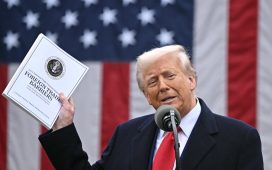Introduction: British Steel to get furnace supplies today, say ministers; UK wage growth remains resilient
Good morning, and welcome to our rolling coverage of business, the financial markets and the world economy.
Raw materials secured by the government will be transported to British Steel’s Scunthorpe plant today to keep its blast furnaces burning. Ministers have taken control of British Steel and and are a race against time to get materials such as coking coal and iron ore to the site.
The business secretary, Jonathan Reynolds, will visit the port in Immingham, North Lincolnshire, as supplies from two ships are unloaded and transported to the plant.
The materials, sent from the US, are enough to keep the furnaces running for weeks, the department for business and trade said, adding that they have been paid for out of its existing budget.
UK regular wage growth has picked up slightly, mainly due to pay rises in the public sector, while the unemployment rate was unchanged and vacancies fell.
The latest labour market snapshot from the Office for National Statistics shows that average weekly earnings rose by 5.9% between December and February from a year earlier excluding bonuses, up from 5.8% in the three months to January. Economists had forecast growth of 6%. Including bonuses, wage growth stayed at 5.6%.
Pay growth is closely watched by the Bank of England, which is trying to gauge whether inflation pressures in the labour market easing enough to allow it to cut interest rates further. Policymakers are also watching for the impact of Donald Trump’s tariffs on the economy.
The UK unemployment rate stayed at 4.4%, while the number of people on company payrolls fell by 78,000 between February and March.
Vacancies in the UK fell below pre-pandemic levels for the first time since the spring of 2021. They fell by 26,000 on the quarter, to 781,000 between January and March.
On the tariff front, US vice president JD Vance has said there is a good chance that the United States and the UK will strike a “great agreement” on trade because of Trump’s love of the country and its royal family.
There was also news last night that the Trump administration is kicking off investigations into imports of pharmaceuticals and semiconductors as part of a bid to impose tariffs on both sectors on national security grounds.
However, markets were cheered by the exemption of smartphones and laptops from the latest US tariffs on Chinese imports, although Trump insisted it was only temporary. There was further relief when the US president said he was exploring possible temporary exemptions to his tariffs on imported vehicles and parts, to give carmakers more time to set up US manufacturing.
He told reporters in the Oval Office:
I’m looking at something to help car companies with it. They’re switching to parts that were made in Canada, Mexico and other places, and they need a little bit of time, because they’re going to make them here.
The pan-European Stoxx Europe 600 index rallied by 2.7% yesterday, while the UK market rose by 2.1%. On Wall Street, the S&P 500 closed 0.8% higher, while the tech-heavy Nasdaq only held on to 0.6% of its earlier chunky gains.
This morning, stock futures are flat to slightly lower.
In Asia, shares were mixed. Japan’s Nikkei rose by 0.8% and South Korea’s Kospi by 0.9%, with strong gains for carmakers Toyota ( up 3.7%) and Honda (up 3.6%). Meanwhile, Hong Kong’s Hang Seng slipped by 0.16% and Chinese markets were also lower, down 0.1% in Shanghai and 0.5% in Shenzhen.
Analysts at Deutsche Bank said:
Markets continued to stabilise over the last 24 hours, with the S&P 500 posting back-to-back gains for the first time since the reciprocal tariffs were announced on April 2.
Whilst equities were recovering, arguably a bigger relief for investors was the recovery in the bond market, which eased fears about some sort of serious financial turmoil developing.
Investors had already been alarmed, and last week’s +49.5bp jump in the 10-year Treasury yield was the biggest weekly jump since 2001, with the yield moving higher every day last week.
However, that began to reverse yesterday, with the 10-year Treasury yield falling by nearly 12 basis points to 4.37%, and this morning it’s fallen further, by 2.3bps to 4.35%.
The Agenda
Key events
Global carmaker shares rise on tariff exemption hopes; Honda may switch some production to US
Shares in carmakers have risen around the world, after Donald Trump said last night that he was considering possible temporary exemptions to his tariffs on imported vehicles and parts, to give carmakers more time to set up US manufacturing.
“I’m looking at something to help some of the car companies,” the US president told reporters in Washington, adding that automotive manufacturers “need a little bit of time” before they can start making components in the US, rather than in countries such as Canada and Mexico.
The European car and parts share index rose by 2.3%.
Shares in Japan’s Toyota and Honda increased by 3.7% and 3.6%, as reported earlier. India’s Tata Motors jumped by 4.7% and Korea’s Hyundai Motors rose by 4.3%. Stellantis was up by 4.3%, while shares in Volkswagen, Mercedes-Benz and BMW rose by more than 2%. Aston Martin increased by 2.4%.
Honda is considering switching some car production from Mexico and Canada to the US, according to the Nikkei newspaper. The Japanese carmaker is aiming for 90% of cars sold in the US to be made in the country to get around the new car tariffs. The US was Honda’s biggest market last year accounting for nearly 40% of global sales, as it sold .4m vehicles there.
Stock markets overall have gained in Europe and parts of Asia, and stock futures are pointing to a higher open on Wall Street later.
The UK’s FTSE 100 is more than 1% ahead at 8,216, up 82 points. Germany’s Dax has gained 1.2% and Italy’s FTSE Mib is 1.6% ahead.
France’s CAC has only increased by 0.3%, weighed down by the luxury goods group LVMH, which reported disappointing quarterly sales. Its shares slumped by 7.5% and the news dragged down other shares in the luxury sector, including the UK’s Burberry, down 2.3%.
France’s prime minister: Trump tariffs shattered trust worldwide
Donald Trump’s trade tariffs have shattered trust around the world and led to a “tsunami of destabilisation,” according to France’s prime minister.
Speaking at a press conference to discuss France’s budget plans for next year, François Bayrou warned that the country faces a moment of truth in terms of getting its public finances in order. He said the US tariffs had damaged trust around the world.
The fact that this power has gone over to the side of the aggressors is a dramatic turn of events, a warning shot that ruins our fundamental vision of the world.
Here’s our full story on the JD Vance comments.
The US is optimistic it can negotiate a “great” trade deal with the UK, JD Vance has said.
Donald Trump imposed sweeping tariffs on imports to the US several weeks ago, sending the global economy into turmoil as stock prices tumbled and fears of a global recession mounted.
Since then, Trump has rowed back on many tariffs, reducing the rate paid on imports from most countries to 10% and exempting electronics such as smartphones and laptops from the levies, including the 145% charge on imports from China.
Britain was spared the most punitive treatment in Trump’s initial tariff announcement, due to the two sides enjoying a largely balanced trade relationship. But British imports in the U.S. still incur a 10% charge while its steel and car sectors incur a rate of 25%.
You can follow the latest on tariffs on our politics live blog:
The latest bank lending survey from the European Central Bank shows tighter credit standards and weaker loan demand from firms in the first quarter of 2025.
This translates into weak investment appetite, even ahead of trade and market turmoil, said ING economist Bert Colijn.
The ECB said:
Banks reported a small further net tightening of credit standards for loans to firms and consumer loans, driven by higher perceived risks. Credit standards eased moderately for housing loans, owing to higher competition. Banks expect a net tightening of credit standards across all three loan segments in the second quarter of 2025.
Banks reported a renewed slight net decrease in loan demand from firms after two quarters of weak recovery. The decrease was driven by a negative contribution from inventories and working capital. Net demand for housing and consumer loans increased, supported mainly by declining interest rates.
Colijn said:
The survey was conducted mid-March, so before “liberation day” and the current market turmoil, so we don’t yet know what further effect this may have had on loan demand and banks’ eagerness to lend. Overall though, private investment expectations have been weak for the months ahead and this survey confirms expectations of a sluggish recovery despite ECB easing.
The big exception remains the mortgage market. Net demand for mortgages increased strongly again in 1Q while credit standards eased. This adds more fuel to the housing market recovery and shows that housing investment is set to be a bright spot among other sluggish investment categories in the eurozone in the months to come. Lower rates are the most important driver of increased demand according to the survey.
The subdued message from the bank lending survey should encourage the ECB to lower rates further, as if they didn’t have enough reasons to do so. With trade and market turmoil, a stronger euro and growth concerns, we expect the ECB to lower rates by 0.25% again on Thursday.
Senior Labour figures have urged the government to review Chinese investment in UK infrastructure in the wake of the British Steel crisis, warning that a rapprochement with Beijing could risk national security.
Government officials insisted on Monday the country remained open to funding from Chinese companies even after a dramatic weekend during which ministers wrested control of the Scunthorpe steelmaking plant from the Chinese owners, Jingye.
Both Downing Street and the Treasury said they believed the row over the Scunthorpe plant to be an isolated commercial dispute, even though the business secretary, Jonathan Reynolds, has not ruled out deliberate Chinese sabotage.
But ministers are now coming under mounting pressure to reconsider their drive to secure further infrastructure investment from China, including from members of their own party.
Downing Street ‘confident’ of getting materials to keep British Steel site running
Here’s more news on British Steel, which is racing to secure the raw materials needed to keep its remaining two blast furnaces running.
Downing Street said the government was “confident” it would be able to secure the products necessary to keep the site running, and that work was ongoing to get a “steady pipeline” of materials. They are needed to prevent the cooling of the blast furnaces, which would risk irreparable damage.
Supplies sent from the US are due to arrive at a port in Immingham, North Lincolnshire, today and will be transported to the Scunthorpe site.
A third ship with coking coal and iron ore is on its way to the UK from Australia after a legal dispute between British Steel and Chinese owner Jingye was resolved.
Jonathan Reynolds, the business secretary, who is visiting the port in Immingham today, said:
We will always act in the interest of working people and UK industry. Thanks to the work of those at British Steel, and in my department, we have moved decisively to secure the raw materials we need to help save British Steel.
Our industries depend on UK steel and – thanks to our Plan for Change – demand is set to shoot up: helping build the 1.5 million homes, railways, schools and hospitals we need to usher in a decade of national renewal.
The government passed emergency legislation to take control of the Scunthorpe site on Saturday after talks with Jingye broke down. The Chinese owner’s plans to stop ordering new raw materials and sell off supplies already had spurred ministers into action, Reynolds has said.
China has accused the UK of “politicising” trade co-operation, and suggested its companies could be put off investing in Britain if they are not treated “fairly”.
Downing Street said it had become “clear” during talks that the Chinese owners “wanted to shut the blast furnaces,” but added it was not aware of any “sabotage” at the plant, when asked if there were any concerns that officials from Jingye may have purposefully attempted to shut down the furnaces.
British Steel has appointed interim executives as efforts continue to try and secure its future.
Away from the tariffs, perhaps the biggest unanswered question in the UK economy is what the recent employer tax hikes mean for the jobs market.
Earlier this year, the mood music looked grim, as survey after survey painted a negative picture about hiring intentions and layoffs, said James Smith, developed markets economist at ING.
So far, there’s little sign of that in the labour market numbers.
“The UK jobs market is showing little sign of damage following this month’s hike in employers’ national insurance,” he concluded.
While the number of employees on company payrolls has fallen by 78,000, Smith noted that separate weekly data on redundancies from the government haven’t increased at all.
That could change, though we would have expected to see some pressure emerge ahead of the employer national insurance hike earlier in April.
Our working assumption, for now, is that the jobs market continues to cool this year, but that we don’t see a material spike in joblessness. And for the Bank of England, that keeps all the focus on wage growth…
The latest one-month and three-month changes in private-sector pay show that the pressure isn’t really abating. The latest rise in the National Living Wage will also keep pay growth supported through the spring.
Given what surveys show, we suspect wage growth will come lower through this year, but only very gradually. It’ll perhaps end the year in the 4.5-5% area.
That doesn’t mean the Bank of England can’t keep cutting rates, however. Services inflation, the Bank’s other major focus right now, should come lower in the coming months; we’ll get fresh data on that tomorrow. Coupled with heightened concerns about the global economy, it should keep the BoE on its current rhythm of gradual rate cuts once per quarter.
We expect a cut in May and two more in the second half of the year.
The British Chambers of Commerce said the high rate of wage growth was a big challenge for employers.
🗣️Deputy Director Public Policy @BCC_Jane: “The rising cost of employment is a major challenge for employers. While wage growth has eased once again, it continues to significantly outpace inflation.”
Read our response to the latest labour market data 👇https://t.co/EvQIzqnvYu
— BCC (@britishchambers) April 15, 2025
Richard Hunter, head of markets at the trading platform interactive investor, has looked at the markets, “where sentiment can turn on a sixpence”.
The optimists are beginning to hope that the most recent pronouncements from the White House represent a dialling down of the extreme measures initially proposed, with the car industry potentially joining some of the technology sector in seeing lesser tariffs. However, the situation remains far from clear, with the pharmaceuticals now seemingly in the crosshairs of the president, which has weighed on the major European players.
The current fallout is also mixed as a result of the ever-changing landscape. The volatility index and US Treasuries both steadied, although the dollar remains out of favour in the face of falling appetite for US assets in general, as well as the more pressing possibility of the economy heading towards recession.
There was some promising news [yesterday] following the release of first-quarter numbers from Goldman Sachs, which reported a jump of 15% in profits, largely driven by market volatility which led to record revenues in its trading divisions.
However, the Goldman Sachs boss also warned that the chances of a US recession have “increased” after Donald Trump’s trade tariffs.
Hunter added:
The incrementally better news has brought back some sense of order to the markets, even though investors remain on high alert for the next potential bombshell from the White House. The main indices have clawed back some of their losses although in the year to date, the Dow Jones remains down by 4.7% and the S&P 500 by 8.1%, while the Nasdaq’s fall of 12.8% has led to it’s remaining in correction territory and significantly away from its record closing high as set in December.
Turning to Asian and UK markets today, he said:
Asian markets were mixed to higher overnight, with Japanese car companies feeling the benefit of potential tariff reductions. Toyota and Honda saw gains of almost 5% [at one stage], while there was an overhanging sense of relief around semiconductor shares following the recent announcements. Even so, these markets are also skittish and are likely to remain so until the economic tariff clouds have at least begun to clear.
UK markets edged cautiously ahead after a raft of data suggested some defiant resilience in the domestic economy. The unemployment rate was unchanged, pay growth continued to strengthen and there was an increase in consumer spending in March, attributed to some unseasonally warmer weather. Even so, the possibility remains that some of this spending has simply been brought forward ahead of the tribulations to come and the fact that the FTSE 250 remains down by 7.6% this year is evidence of investor caution on prospects.
Rob Wood, chief UK economist at Pantheon Macroeconomics, was not concerned, however.
Most likely job numbers are stagnating rather than contracting sharply, and the labour market is loosening gradually, despite disappointing payrolls figures. Admittedly, firms cut payrolls by the most in eleven months in March, potentially as they respond to April’s payroll tax hike by reducing headcount.
But we would treat the initial estimate of payrolls with a large bucket of salt because the 78,000 month-to-month fall will get raised markedly in next month’s figures to around no change if revisions continue to follow the pattern of the past couple of years.
While total pay growth is slowing, it’s still very high, he noted, but overall:
There is enough here for the MPC [monetary policy committee] to cut interest rates in May and to signal further reductions ahead, with signs—albeit that will be revised heavily—of job growth weakening and pay growth slowing gradually. Accordingly rate setters will likely sound a little more dovish at their May meeting, especially after the economic and market ructions following president Trump’s tariff hikes.
Higher uncertainty and plenty of sand in the wheels of global trade will inevitably hit UK growth and raise unemployment. We cut our 2025 growth forecast to 0.7% last week, from 1.1% before, and raised our projection for the peak unemployment rate to 5.1%, from 4.9% previously. That should help bring inflation back to target, and the MPC can, we think, afford an extra rate cut this year.
Here’s our full take on the UK labour market figures.
The number of workers on UK company payrolls has fallen at the fastest pace since the height of the Covid pandemic amid mounting global uncertainty and warnings that Rachel Reeves’s budget measures could lead to job losses.
Figures from the Office for National Statistics show the number of people employed in at least one job paid through pay as you earn fell by 78,000 in March after a revised fall of 8,000 in February.
Reflecting a slowdown in the jobs market, the latest snapshot showed annual pay growth rose slightly in the three months to February and remained at historically high levels. Regular pay, excluding bonuses, rose to 5.9%, from a revised 5.8% in the previous rolling three-month period to the end of January. This was slightly below a prediction of 6% among City economists.
Despite the drop in the number of workers on company payrolls, the ONS said its official unemployment rate remained unchanged at 4.4% in the three months to February.
European markets continue rally; dollar wins reprieve from selling
The positive mood has lifted European stock markets again, while the dollar is also higher.
The UK’s FTSE 100 index rose by 40 points, or 0.5%, to 8,175 in early trading while Germany’s Dax added 0.7%, Italy’s FTSE MiB gained 0.76% and France’s CAC edged 0.1% higher.
The dollar is enjoying a reprieve from the heavy selling seen in recent days and is up slightly this morning, by 0.2% against a basket of major currencies. The pound is trading 0.1% higher against the greenback while the euro has slipped by 0.1%.
Gold, seen as a safe haven in times of turbulence, is rising again, up by 0.4% to $3,222 an ounce.
Oil prices have also increased, with Brent crude and US crude – the two global benchmarks – both up by around 0.7% at $65.35 a barrel and $62 a barrel respectively.
Introduction: British Steel to get furnace supplies today, say ministers; UK wage growth remains resilient
Good morning, and welcome to our rolling coverage of business, the financial markets and the world economy.
Raw materials secured by the government will be transported to British Steel’s Scunthorpe plant today to keep its blast furnaces burning. Ministers have taken control of British Steel and and are a race against time to get materials such as coking coal and iron ore to the site.
The business secretary, Jonathan Reynolds, will visit the port in Immingham, North Lincolnshire, as supplies from two ships are unloaded and transported to the plant.
The materials, sent from the US, are enough to keep the furnaces running for weeks, the department for business and trade said, adding that they have been paid for out of its existing budget.
UK regular wage growth has picked up slightly, mainly due to pay rises in the public sector, while the unemployment rate was unchanged and vacancies fell.
The latest labour market snapshot from the Office for National Statistics shows that average weekly earnings rose by 5.9% between December and February from a year earlier excluding bonuses, up from 5.8% in the three months to January. Economists had forecast growth of 6%. Including bonuses, wage growth stayed at 5.6%.
Pay growth is closely watched by the Bank of England, which is trying to gauge whether inflation pressures in the labour market easing enough to allow it to cut interest rates further. Policymakers are also watching for the impact of Donald Trump’s tariffs on the economy.
The UK unemployment rate stayed at 4.4%, while the number of people on company payrolls fell by 78,000 between February and March.
Vacancies in the UK fell below pre-pandemic levels for the first time since the spring of 2021. They fell by 26,000 on the quarter, to 781,000 between January and March.
On the tariff front, US vice president JD Vance has said there is a good chance that the United States and the UK will strike a “great agreement” on trade because of Trump’s love of the country and its royal family.
There was also news last night that the Trump administration is kicking off investigations into imports of pharmaceuticals and semiconductors as part of a bid to impose tariffs on both sectors on national security grounds.
However, markets were cheered by the exemption of smartphones and laptops from the latest US tariffs on Chinese imports, although Trump insisted it was only temporary. There was further relief when the US president said he was exploring possible temporary exemptions to his tariffs on imported vehicles and parts, to give carmakers more time to set up US manufacturing.
He told reporters in the Oval Office:
I’m looking at something to help car companies with it. They’re switching to parts that were made in Canada, Mexico and other places, and they need a little bit of time, because they’re going to make them here.
The pan-European Stoxx Europe 600 index rallied by 2.7% yesterday, while the UK market rose by 2.1%. On Wall Street, the S&P 500 closed 0.8% higher, while the tech-heavy Nasdaq only held on to 0.6% of its earlier chunky gains.
This morning, stock futures are flat to slightly lower.
In Asia, shares were mixed. Japan’s Nikkei rose by 0.8% and South Korea’s Kospi by 0.9%, with strong gains for carmakers Toyota ( up 3.7%) and Honda (up 3.6%). Meanwhile, Hong Kong’s Hang Seng slipped by 0.16% and Chinese markets were also lower, down 0.1% in Shanghai and 0.5% in Shenzhen.
Analysts at Deutsche Bank said:
Markets continued to stabilise over the last 24 hours, with the S&P 500 posting back-to-back gains for the first time since the reciprocal tariffs were announced on April 2.
Whilst equities were recovering, arguably a bigger relief for investors was the recovery in the bond market, which eased fears about some sort of serious financial turmoil developing.
Investors had already been alarmed, and last week’s +49.5bp jump in the 10-year Treasury yield was the biggest weekly jump since 2001, with the yield moving higher every day last week.
However, that began to reverse yesterday, with the 10-year Treasury yield falling by nearly 12 basis points to 4.37%, and this morning it’s fallen further, by 2.3bps to 4.35%.
The Agenda







